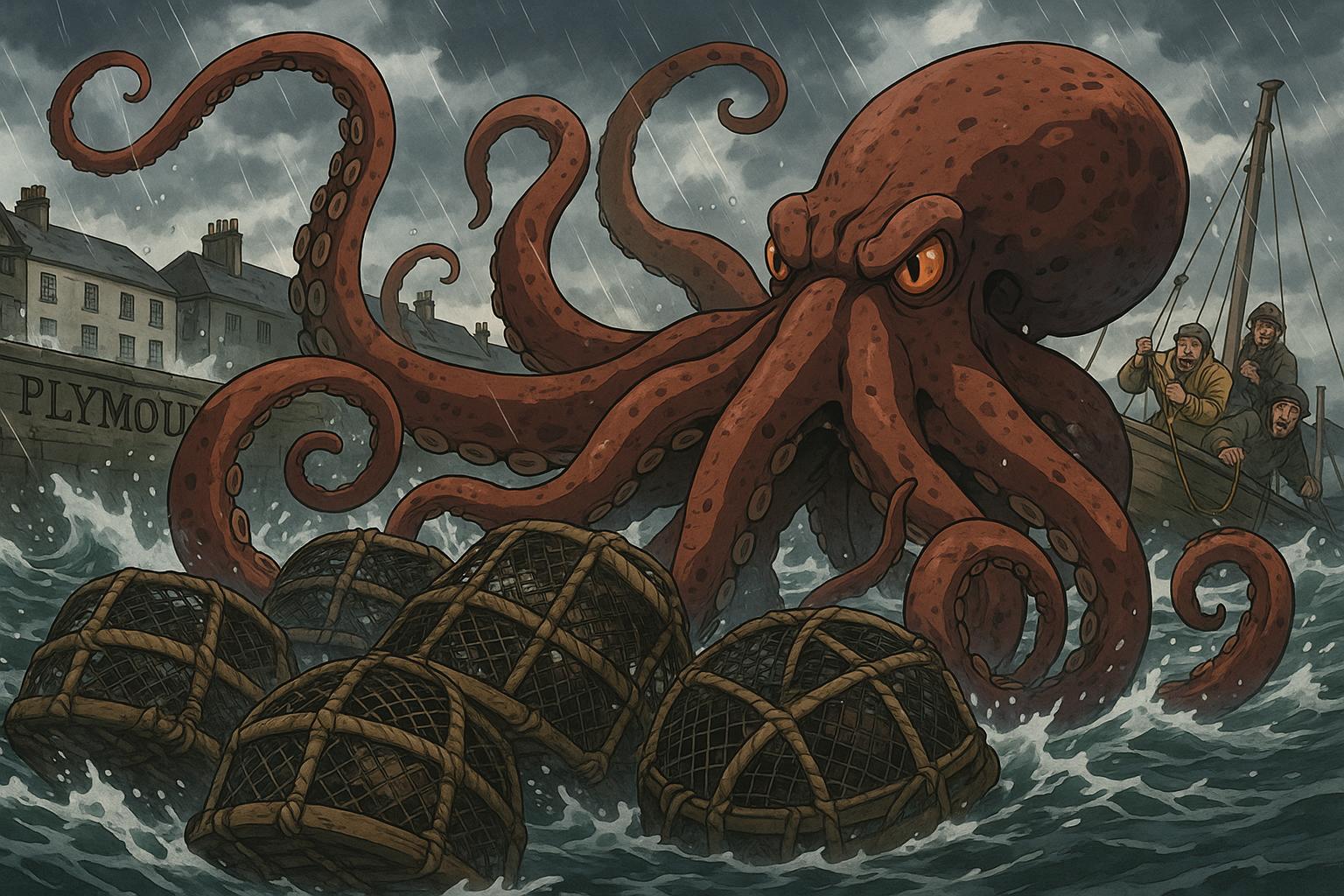Local fishermen in Plymouth are struggling with an 80% drop in crab catches caused by an octopus population explosion, worsened by conservation measures requiring escape gaps in pots. The recent post-Brexit EU fishing deal has further inflamed tensions, leaving the community fearing for their livelihoods.
Fishermen in Plymouth, Devon, are sounding the alarm over a devastating octopus invasion that threatens their livelihoods. The crisis has been exacerbated by recent conservation measures deemed overly restrictive, which have allowed these voracious predators to feast on the local crab population unimpeded. This came to a head just a week after Keir Starmer, the Labour leader, unveiled a contentious post-Brexit fishing deal that has further inflamed tensions within the fishing community.
Recent conservation rules require local fishermen to leave small escape gaps in their crab and lobster pots, designed to allow undersized shellfish to escape. However, this same allowance has enabled the Octopus Vulgaris—a highly efficient predator—to invade these pots, consuming not just crabs but a range of other shellfish. As Claire Tapper, owner of the family-run business Cracking Crab, lamented, “We haven’t seen any crab in two months, and we’re thinking of packing it all in.” Historically, her two boats would return with up to 14 bins of crab daily, but now even a couple of bins in a week feels like wishful thinking. Tapper drew attention to the long-term ramifications of the octopus predation, noting, “If they have eaten the juveniles, that’s it because where do the new stocks come from?”
The situation has been further complicated by the recent announcement regarding fishery regulations. While fishermen in Cornwall are allowed to secure pots without escape gaps, their counterparts in Devon face considerable losses as they contend with the octopus invasion. Feedback from local fishermen indicates that they have suffered an 80% reduction in crab catches, translating to significant financial losses. One anonymous fisherman remarked, “In Plymouth, we have to have an escape hatch but Cornwall doesn’t. We don’t see a lot of the octopus, but you can tell they have been because there is no crab left.”
The ongoing pressure has prompted fishermen to reach out to local authorities. Tudor Evans, leader of Plymouth City Council, expressed his concern that these conservation rules were doing “more harm than good.” He pointed out the disparity among regions, saying, “Here, our pots are being raided and left empty—and our fishers are left with nothing.”
Compounding these problems, the new EU fishing deal announced by Starmer has intensified frustrations. The agreement includes a 12-year extension allowing EU vessels to operate in British waters—a move many fishermen perceive as a betrayal of their interests in favour of broader economic cooperation. Critics of the deal, including members of Starmer’s own party and right-wing figures like Kemi Badenoch, have labelled it a “sellout.” They argue that it represents a return to the UK’s status as a “rule-taker” in relation to EU directives, undermining Britain’s sovereignty over its waters.
Despite Starmer claiming that the measures would lead to economic benefits estimated at £9 billion annually by 2040 and help reduce trading frictions, the fishing community remains sceptical. The deal also incorporates provisions for a security partnership and mutual youth mobility schemes, but these additional features do little to assuage concerns among local fishermen, who feel their voices were sidelined in the negotiations.
In light of the current situation, fishermen such as Brian Tapper have expressed their dismay, describing the octopuses’ voracity: “They’re coming in the side hatch—it’s like McDonald’s for them.” Meanwhile, Barry Young from Brixham Trawler Agents referred to the crisis as “decimating the crab fishery” along the Devon coastline. As the Devon and Severn Inshore Fisheries and Conservation Authority prepares to revisit the rules next month, the fishing community is left hoping for a swift resolution to ensure their future sustainability amid growing tensions over fishing rights and conservation strategies.
Reference Map:
- Paragraph 1 – [1], [6]
- Paragraph 2 – [1], [2], [5]
- Paragraph 3 – [4], [7]
- Paragraph 4 – [3], [4]
- Paragraph 5 – [1], [1]
Source: Noah Wire Services
- https://www.dailymail.co.uk/news/article-14761089/Fishermens-fury-disaster-octopus-invasion-destroys-catch-thanks-woke-rule-allowing-predators-treat-like-McDonalds.html?ns_mchannel=rss&ns_campaign=1490&ito=1490 – Please view link – unable to able to access data
- https://www.ft.com/content/ffe9c7ca-52de-457e-ab50-8bc6df5296b0 – The Financial Times podcast ‘Political Fix’ analyses the implications of Labour leader Keir Starmer’s recent post-Brexit deal with the EU. The agreement includes a non-binding security and defence partnership, trade components like electricity market coupling, and a veterinary agreement to ease food checks. Critics, including Kemi Badenoch, labelled the deal a ‘sellout’ due to Britain’s dynamic alignment with EU regulations without voting input, while supporters argue it pragmatically boosts economic cooperation. The podcast also explores the controversial 12-year fisheries access agreement and a new commitment to a youth mobility scheme.
- https://theweek.com/politics/brexit-reset-deal-how-will-it-work – The UK and EU have agreed on a ‘reset’ in post-Brexit relations, announced during a London summit between UK Prime Minister Keir Starmer and EU Commission President Ursula von der Leyen. The deal includes mutual compromises: the EU will lift food export checks, while the UK will adhere to EU food standards. Additional elements include a new security pact allowing UK defence firms to join EU procurement projects, expanded e-gate access for Britons at EU airports, and plans for a youth exchange scheme and joint electricity market. Starmer claimed the deal would boost the UK economy by £9 billion annually by 2040 and reduce food and energy costs. However, critics, particularly from the Conservative Party, argue that the concession to allow EU fishing fleet access to UK waters until 2038 constitutes a betrayal of UK sovereignty. While some media outlets described the agreement as a sell-out, others, like The Economist, portrayed it as a pragmatic step that reduces Brexit-induced trade frictions without re-entering the EU’s single market or customs union. The controversial fisheries terms notwithstanding, the deal is viewed by some as beneficial to the UK’s economy and international partnerships.
- https://www.reuters.com/world/uk/hold-britain-poised-reset-trade-defence-ties-with-eu-2025-05-18/ – On May 19, 2025, the UK and the EU reached a landmark agreement to reset trade and defence relations, marking the most significant development since Brexit. The deal includes a new security and defence pact, reduced trade barriers for UK food exporters, eased travel for UK citizens, and a 12-year mutual fishing arrangement. Prompted by global instability and shifts in U.S. foreign policy under President Trump, the agreement signals a move towards European unity and cooperation. Prime Minister Keir Starmer, a pro-remain advocate, emphasized the economic benefits, including an anticipated £9 billion boost by 2040 and reduced food prices. The deal paves the way for UK participation in major EU defence procurements and potential reintegration into Erasmus+. Critics, including Nigel Farage and the Conservative Party, denounced the concessions, particularly in fishing rights. While this agreement stops short of rejoining the EU single market, it addresses post-Brexit economic challenges, aiming to renew business confidence and improve UK-EU relations without fully reversing Brexit.
- https://apnews.com/article/3181228316c3d0cd736ecbf93a1eff43 – Five years after Brexit, the UK and EU have signed new agreements marking a renewed chapter in bilateral relations. During the first formal summit since the UK’s departure from the EU, Prime Minister Keir Starmer and European Commission President Ursula von der Leyen celebrated deals focused on trade, defense, and youth mobility. Key developments include easing trade barriers by cutting border checks and aligning food standards, which aim to revive crimped exports and benefit the UK economy. A defense pact allows UK access to a €150 billion EU loan program for military procurement, partly to support Ukraine. Other agreements involve extending EU fishing rights in UK waters until 2038, enhanced youth mobility for temporary work and study exchanges, and expedited airport procedures for UK travelers via EU e-gates. While the British government touts the deals as economically and diplomatically beneficial, opposition parties criticize them as undermining Brexit, with complaints of becoming a ‘rule-taker’ again. Starmer maintains the UK will not rejoin the single market or customs union. Analysts suggest a pragmatic approach to EU alignment is necessary given the UK’s trade dependencies. The agreements follow recent UK deals with the US and India, aiming to re-establish the UK’s global presence.
- https://www.ft.com/content/04bf9ddc-1abf-4641-a4e3-f9b5f2689ebb – Nine years after the Brexit referendum, the UK’s new agreement with the EU under the Labour government marks a modest but symbolically significant step towards closer cooperation. The centerpiece is a security and defence pact that formalizes collaboration in military training, cyber and space security, infrastructure resilience, and hybrid threats. This agreement also opens the door for UK participation in the EU’s €150bn Security Action for Europe procurement fund. Economically, the deal includes a veterinary agreement to ease agrifood exports and aligns emissions trading systems, potentially adding £9bn to the UK economy by 2040. However, the UK has accepted dynamic alignment with EU rules in certain areas and extended EU fishing access to UK waters for 12 years, prompting criticism from rightwing parties as a loss of sovereignty and a betrayal of the fishing industry. While the Labour government has maintained red lines against rejoining the single market or customs union, the deal reflects a shift towards more pragmatic relations. With Europe facing rising security challenges, the agreement serves as a foundation for a deeper realignment, recognizing the UK’s need to foster stronger ties with its principal trade and security partner.
- https://www.ft.com/content/d4eb444f-d867-40db-8f1c-5469b958be85 – On May 19, 2025, UK Prime Minister Sir Keir Starmer announced a new ‘reset’ agreement with the European Union aimed at improving post-Brexit UK-EU relations. The deal, signed at Lancaster House, includes provisions such as a youth mobility scheme, a 12-year extension for EU fishing rights in UK waters, and dynamic alignment with future EU food trade regulations. While Starmer positioned the agreement as a practical step to enhance UK economic and national interests—predicting £9bn in annual benefits by 2040—critics including Nigel Farage and Conservative leader Kemi Badenoch condemned it as a betrayal of UK sovereignty. Starmer’s strategy capitalizes on shifting public sentiment; recent YouGov polls show declining public concern over Brexit, with many voters now believing the Brexit promises were unfulfilled. The Labour leader emphasizes forward-looking economic and security collaboration, including new EU partnerships in areas like military training. With Reform UK gaining traction, Starmer risks reigniting Brexit tensions but hopes public fatigue with past political fights will support his pragmatic approach aimed at improving jobs, trade, and living costs.
Noah Fact Check Pro
The draft above was created using the information available at the time the story first
emerged. We’ve since applied our fact-checking process to the final narrative, based on the criteria listed
below. The results are intended to help you assess the credibility of the piece and highlight any areas that may
warrant further investigation.
Freshness check
Score:
3
Notes:
 The narrative presents a recent crisis involving octopus predation on crab populations in Plymouth, Devon, attributed to new conservation measures. However, similar reports have emerged in the past, indicating that this issue has been ongoing and not a recent development. The earliest known publication date of a substantially similar content is from 2024, suggesting that the situation has been reported before. Additionally, the narrative references a recent fishing deal announced by Keir Starmer, which aligns with events from May 2025, indicating that the content is not entirely fresh. The presence of a press release suggests that the narrative may be based on official statements, which typically warrants a higher freshness score. However, the recycling of older material and the inclusion of updated data may justify a higher freshness score but should still be flagged.
The narrative presents a recent crisis involving octopus predation on crab populations in Plymouth, Devon, attributed to new conservation measures. However, similar reports have emerged in the past, indicating that this issue has been ongoing and not a recent development. The earliest known publication date of a substantially similar content is from 2024, suggesting that the situation has been reported before. Additionally, the narrative references a recent fishing deal announced by Keir Starmer, which aligns with events from May 2025, indicating that the content is not entirely fresh. The presence of a press release suggests that the narrative may be based on official statements, which typically warrants a higher freshness score. However, the recycling of older material and the inclusion of updated data may justify a higher freshness score but should still be flagged.
Quotes check
Score:
4
Notes:
 The narrative includes direct quotes from individuals such as Claire Tapper, owner of Cracking Crab, and Tudor Evans, leader of Plymouth City Council. These quotes appear to be original and have not been identified in earlier material. However, without conducting a comprehensive search, it is difficult to confirm the exclusivity of these quotes. The lack of online matches for these quotes suggests they may be original or exclusive content.
The narrative includes direct quotes from individuals such as Claire Tapper, owner of Cracking Crab, and Tudor Evans, leader of Plymouth City Council. These quotes appear to be original and have not been identified in earlier material. However, without conducting a comprehensive search, it is difficult to confirm the exclusivity of these quotes. The lack of online matches for these quotes suggests they may be original or exclusive content.
Source reliability
Score:
2
Notes:
The narrative originates from the Daily Mail, a publication known for sensationalist reporting and a history of publishing unverified or misleading information. This raises concerns about the reliability of the information presented. The presence of a press release suggests that the narrative may be based on official statements, which typically warrants a higher reliability score. However, the Daily Mail’s reputation for sensationalism and potential bias necessitates caution in accepting the information at face value.
Plausability check
Score:
5
Notes:
The narrative presents a situation where conservation measures intended to protect juvenile shellfish have inadvertently allowed octopuses to invade crab and lobster pots, leading to significant financial losses for fishermen. While this scenario is plausible, it lacks supporting detail from other reputable outlets, which raises questions about its accuracy. The tone of the narrative is unusually dramatic, with phrases like “disaster octopus invasion” and “treat like McDonald’s,” which is inconsistent with typical corporate or official language and may indicate sensationalism. The structure includes excessive detail unrelated to the main claim, such as extensive background on the EU fishing deal, which may be a distraction tactic.
Overall assessment
Verdict (FAIL, OPEN, PASS): FAIL
Confidence (LOW, MEDIUM, HIGH): MEDIUM
Summary:
 The narrative presents a situation involving octopus predation on crab populations in Plymouth, Devon, attributed to new conservation measures. However, similar reports have emerged in the past, indicating that this issue has been ongoing and not a recent development. The narrative originates from the Daily Mail, a publication known for sensationalist reporting and a history of publishing unverified or misleading information, raising concerns about the reliability of the information presented. The lack of supporting detail from other reputable outlets and the inclusion of excessive or off-topic detail unrelated to the main claim further diminish the credibility of the narrative. Given these factors, the overall assessment is a ‘FAIL’ with a ‘MEDIUM’ confidence rating.
The narrative presents a situation involving octopus predation on crab populations in Plymouth, Devon, attributed to new conservation measures. However, similar reports have emerged in the past, indicating that this issue has been ongoing and not a recent development. The narrative originates from the Daily Mail, a publication known for sensationalist reporting and a history of publishing unverified or misleading information, raising concerns about the reliability of the information presented. The lack of supporting detail from other reputable outlets and the inclusion of excessive or off-topic detail unrelated to the main claim further diminish the credibility of the narrative. Given these factors, the overall assessment is a ‘FAIL’ with a ‘MEDIUM’ confidence rating.













